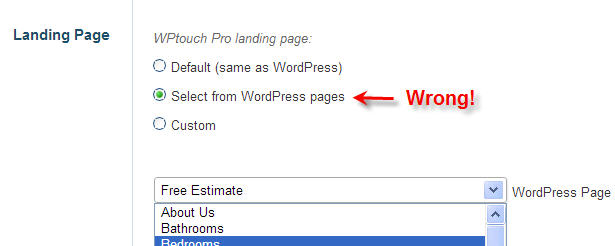 Look how old this is!
Look how old this is! I post at SearchCommander.com now, and this post was published 11 years 4 months 21 days ago. This industry changes FAST, so blindly following the advice here *may not* be a good idea! If you're at all unsure, feel free to hit me up on Twitter and ask.
The two most important things I personally learned at SMX Advanced back in June were both about mobile, and neither one was very technical.
One of them however, was a real eye-opener for me, and I literally smacked myself in the forehead over my stupidity. I realized that we had probably set up about 60 websites incorrectly over the years, and we had to fix ’em!
Different Search Results
First, was the startling news that Google was changing the ranking results for mobile vs. desktop search. They announced it during a session as if it was some sort of feature, but I’d call it more of a “bug fix” really; I mean, who wants go to a page that they can’t read?
I remember the very first time I clicked on a search result from my phone that went to a poorly rendered page I couldn’t navigate, and I thought to myself, “Google better fix that”. It shouldn’t even BE in the search results. Why even bother showing a site on my phone that I can’t see well and navigate? Well, now they won’t. Good job, Google
Incorrect “Mobile Welcome”
Second, and far more important, I learned that we had been thoughtlessly setting up websites WRONG and the only reason it took me this long to write about it is because I wanted to be sure that we had fixed all of ours first, and in some cases we had to contact site-owners that we no longer had access to their domains.
We were sending all mobile users to a specific landing page, but as of April 2013, this has been wrong according to Google:
Irrelevant redirects
A common issue is redirecting users to irrelevant pages. For example, if a user visits example.com/article29, your website should redirect them to the equivalent mobile-optimized page, such as m.example.com/article29, instead of to the m.example.com homepage. This makes sure that incoming links and users’ bookmarks work across devices.
Actually, if you think about it, it’s ALWAYS been a dumb idea to redirect them to a specific mobile welcome page, yet I had used our favorite mobile plug-in WP Touch to incorrectly set up dozens of websites. I was mortified.
There’s a setting in the back end of WP Touch that makes this easy, and we took advantage of it, but there should be a warning in the admin that “using this setting can be harmful to your health –

Why is this wrong?
Because you’re not giving the user what they want!
It’s perfectly fine to control the experience that your mobile visitor has, by showing them just the choices that you know they want, like contact information, directions, maps, reservations, comments or reviews, social stuff, etc.
You can limit my navigation, my options, the sidebar, and even the graphics, but the core content of the page should remain the same. If I do a search for “fried blue widgets” from my phone and find your recipe page in the search results, then that’s what I want!
But if you have an auto-detection / redirection taking place, whisking me off to what YOU consider to be a “better mobile experience” then you’d damn sure better make sure that the recipe is on the page I get redirected to.
A lot of “mobile solutions” don’t do that, and it’s something that should be a priority. Get it?
How can you check your site?
If you’re not the one with “hands on” your back end, and you don’t know how to check, just search Google from your mobile phone and see what happens when you land on specific pages.
In the search box at Google type site:YourDomain.com and you’ll see all of the pages on your site. Scroll down to a page other than your home page, and click the result. Are you seeing what you expect, and what is described in the search results, or are you whisked away to an irrelevant “mobile experience” that someone (like me) thought was a good idea at the time?
Summary
If your site is not mobile friendly, you will not rank as well on Google anymore for searches done FROM a mobile device, and when users get there, they’d better see what they expected to see, or Google might just remove you from the search results altogether.




















